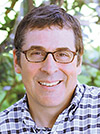Hard road to the monastery
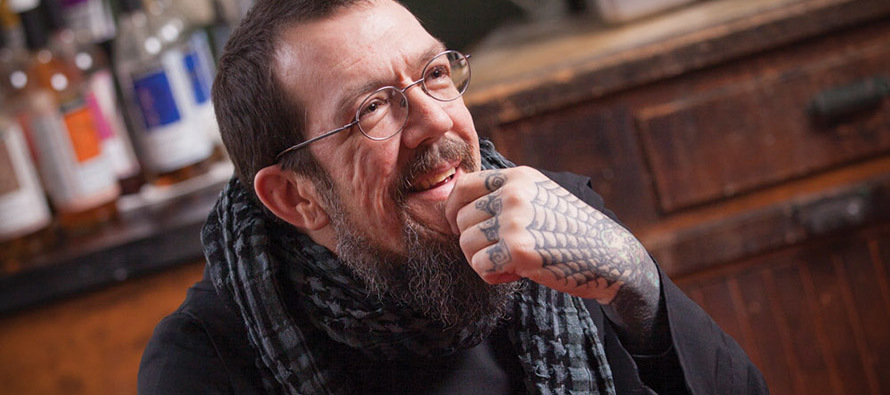
Several years ago Brother Andre Love, O.S.B. found his way to Mount Angel Abbey in Oregon—a place he now calls home, with men he now calls “Brother.” (Photo courtesy of Mount Angel Abbey)
Lips quivering, nose running, and tears flowing, Bobby Love read through his notebook. The priest listened. The pages detailed 25 years of drug abuse, sexual excess, heavy drinking, and divorces. Love had treated scores of people shabbily.
He couldn’t believe he was uttering his deeds aloud. Head resting in heavily tattooed hands, he finished the list, then looked up, expecting the priest to be dialing 9-1-1.
But Father James Coleman, pastor of St. Joseph Parish in Salem, Oregon, said only, “Is that it?”
Love was surprised and even a little offended by his reaction. He thought his list of sins warranted a stronger response. Apparently, Father Coleman had heard worse and so offered absolution and a penance the penitent thought too light for decades of debauchery.
So Love also said, “Is that it?”
Father Coleman told Love that he was not getting off easily: “You’re going to have to go to RCIA. God’s got plans for you.”
Love did enter the Rite of Christian Initiation of Adults. He reclaimed his faith and was confirmed. Now, 11 years later, he is known as Brother Andre Love, a Benedictine monk of Oregon’s Mount Angel Abbey. He is named after Saint André Bessette, the Holy Cross Brother known for healings and patron saint of a parish on Portland’s skid row, a refuge for hopeless cases.
“I still laugh about it,” Love says of his vocation. “One of the things that is most affirming about it is that it’s so ridiculous that it must be of God. This is not something I would have pursued. This is not something I would have dreamed about. This is not something that I would have planned for. Yet every one of my desires in life has been fulfilled to a degree that is ridiculous—that’s the only word I can use to describe this.”
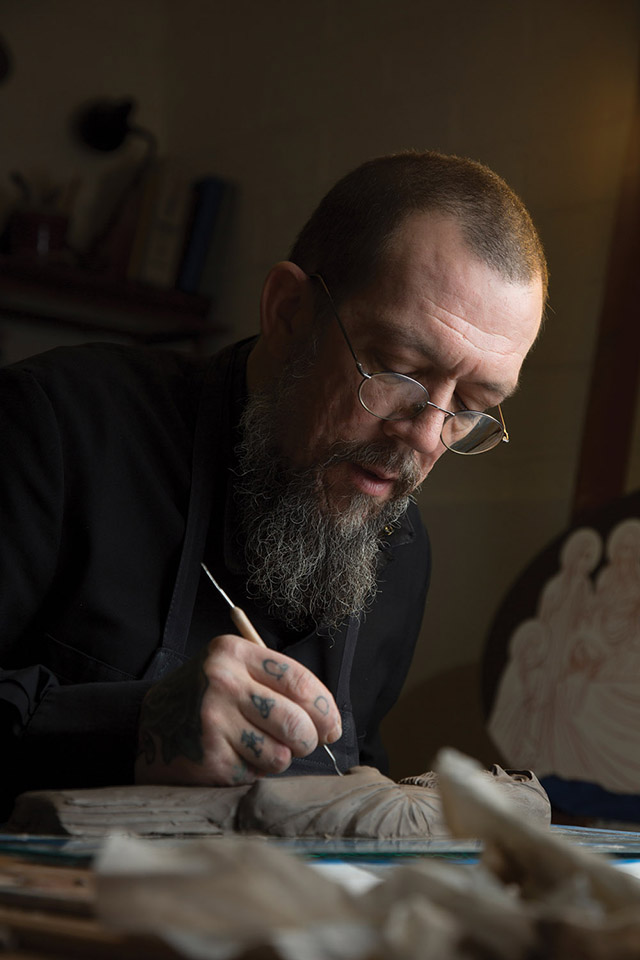
Rocky start
Raised in a devout and moneyed Catholic family in Texas and Mississippi, he was the only boy among five children. With an artistic personality, he clashed frequently with a numbers-oriented father. When Bobby was a teenager, he and his dad came to a mutual agreement—Bobby must leave home. The boy also left the church.
He joined the army at age 17 and stayed for five years. His commanders liked his work and gave him responsibility as a trainer who prepared young soldiers for the Gulf War in 1991. What he did off-duty was another matter. He partied hard with booze, drugs, and sex. With every paycheck, he got a new tattoo.
After discharge, he embraced art and painting, and he worked briefly for Tower Records in New York. He saw tattoo artists making good money and entered the field, earning as much as $100 an hour. “It was going to be a wonderful life,” he says.
Along with money came more intemperance. But, like a hipster Saint Augustine, he began feeling miserable. He was a slave to his habits. “I got to this point of hopelessness,” he says.
Trying to fill the void, he got married a few times and traveled: New York, Houston, Austin, Seattle, New Orleans. It was in the latter city that a close friend was murdered brutally on a sunny Tuesday afternoon. The shock changed Love.
“It was so sudden, so quick, so unexpected that I thought, ‘This could happen to me. And if this were to happen to me today, I’m going to hell. No getting around it. Absolutely. One-way ticket.’ ”
He responded to this new awareness in a way that felt familiar to him: He had “Have mercy” tattooed across his shoulders. “If by some chance I ended up at the gates, I had no defense. I just hoped God would have mercy,” he says. “That was my first prayer as an adult man.”
He asked himself why he felt so miserable when he had so much money and fun. It occurred to him that, despite his last name, his life was devoid of love.
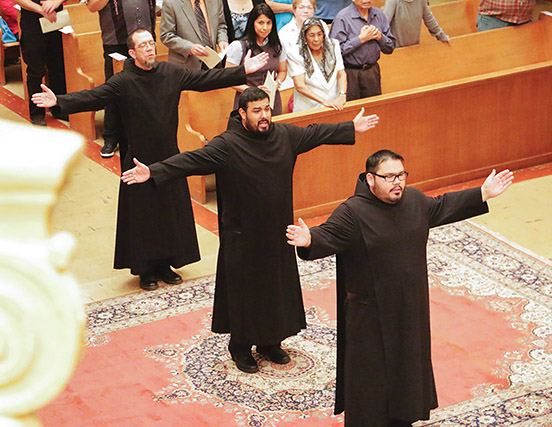
He realized he had disposed of essential parts of himself—family and faith. “I was starving in a way,” he explains.
Second chance
Love left his lucrative tattoo career, not because he thinks it’s inherently bad, but because he could no longer abide many of the sleazy images and words people asked him to etch permanently on their bodies. “Here are all these people coming to see my work and give me their money and I just can’t stand it,” he says. “I had nothing to give.”
On a bus headed to drug rehab, he looked out the window and saw an elderly woman lugging a duffel bag as large as she was. He saw it as signifying his own load of sin. That’s when he filled a notebook with his misdeeds and called St. Joseph Church in Salem, suggesting that the priest set aside a big block of time and brew a pot of coffee.
After Confession, he felt new strength. “It occurred to me I have a clean slate. It’s all wiped away,” he says.
He made a second list, one with names of all the people he needed to ask for forgiveness.
“God had shown me this mercy. God had given me this second chance,” he says. “But there was still all this animosity and hurt lingering out there in these relationships.” He wanted to look into the eyes of his sisters, his mother, his ex-wives and ask how he could set things right.
If there be skilled workmen in the monastery, let them work at their art in all humility, if the abbot giveth his permission (Rule of St. Benedict 57:1).
This passage in the Rule of Benedict led to one of the more important questions I was to answer during the discernment period prior to my entry into the monastery. The abbot asked me how would I feel if I was not asked to work as an artist for the community. The question was truly a test of the spirit.
My initial reaction was to balk. Ever since my youth, I have identified as an artist. This identity has completely shaped how I perceive and interact with the world. The abbot might as well have asked me to stop being a man. Impossible; it is who I am. After some reflection it occurred to me, this must be how the rich man felt when Jesus told him to sell all he had, give to the poor, and follow him.
My answer to the abbot was that I came to the monastery to be a monk not an artist. I gave that response in trusting obedience to God. He knows my heart and my deepest desires. He alone knows where I will find fulfillment. I did, however, add one little caveat: that no matter what task I am assigned it will be accomplished in an artistic manner. It will be brought to fruition with a mind and heart sensitive to form and design, beauty and order.
Upon entry to Mount Angel, I was blessed with the opportunity to share my talents as an artist, as a means of contributing to the community. For this, I am extremely grateful. I see in my role, as artist and curator of art for the abbey, the ability to share the gospel message in a unique way that seems tailored for my personality. By using a vocabulary of symbols or through mindfully arranged exhibits in the museum, I am participating in a silent dialog with the many visitors of Mount Angel Abbey. My hope is that I can convey with integrity the relevance and connectedness of all God’s universe.
Of course, the monastery is a busy place and art is not all I am assigned to do. But even when I am scrubbing toilets, it is done with an artistic eye for detail. I find myself trying to add just the right measure of cleanser to the bowl to achieve a perfect shade of blue, similar to the sky on a cloudless summer day. In this way, I am expressing my appreciation for the beauty of creation. This humble endeavor most likely will go unnoticed, but it is still done that God may be glorified in all things.
— Brother Andre Love, O.S.B.
He traveled the country for several months making apologies. Most people accepted graciously. At least one wished he would just die, but came around later.
After learning about his faith from an adult perspective in RCIA, he moved to the Oregon coast to build a new life. “Obviously I’m supposed to get married, right? And have a family and raise cool little Catholic kids and they will all be awesome with little Mohawks,” he says.
He was waiting for God to bring the perfect woman into his life. He sat on the beach and watched couples run into each other’s arms seemingly in slow motion. After a while, he started getting angry.
Surprising direction
Love went to complain to the parish priest in Newport, who suggested that maybe Love had another calling—monastic life.
“I thought that was crazy talk,” Love says. But he took a brochure from the priest and recognized pictures of Mount Angel Abbey, a place he had visited to see its art and architecture. Thinking of it as a blind date with a monastery, he went on a discernment retreat, sporting dreadlocks, a long beard, tattoos, and dicey curriculum vitae.
“They were looking at me and saying ‘What?’ ” Love recalls.
Father Odo Recker, the vocations director at Mount Angel, admits that he did not know at first what to do with Love. No one had looked and spoken like that before while trying to enter the monastery.
“It was realizing that this was the real deal,” says Recker. “This has been a very positive thing for us. You need to be open to God’s surprises. You need to be not too quick to judge.”
Welcoming the new recruit pushed Mount Angel’s famous hospitality up a notch.
“I was very transparent with them,” Love says. “This was not my plan anyway, so if it didn’t work out, well, that would be all right.”
A year elapsed between his first discernment retreat and his entrance into postulancy, a short-term live-in experience. During that period in between, he attended every official vocation event the abbey had, plus a week or two independently. He recalls the moment when finally he was allowed to stand in choir with the monks to pray the office. “I was giddy like a schoolgirl,” he says. One monk teased him about how his hands trembled as he held the book of psalms.
In some of the later retreats, Love was allowed to live among the monks and work with them side-by-side. He knew he loved the life, but the community had questions for him, too.
During Love’s year of decision-making, the abbot asked him point blank: Can you guarantee that you will not go back to substance abuse?
Love said he could offer no such guarantee. But he did explain to the abbot that he had been clean and sober for a few years already and cited the notion of taking things one day at a time: “I said if I do today and tomorrow what I did yesterday, we will be in good shape.” Monks, Love says, are to do all in moderation. That code has given him additional strength in his ongoing recovery.
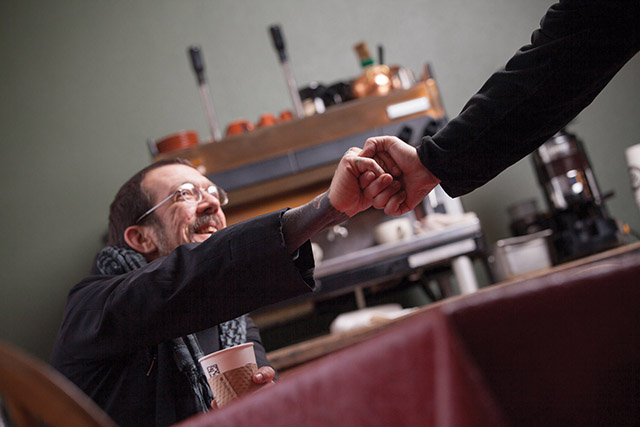
New life
Love has been a Benedictine since entering in 2009. He professed his solemn, or final, vows in 2014. Instead of abandoning art, he has continued, creating holy images as an iconographer. The abbot assigned him as curator of the abbey art collection and museum. Because of the mechanical skills he gained in the army and from taking care of his motorcycle, Love is also caretaker of the massive bells high in a tower above the church.
“Brother Andre brings to the community what every monk should bring in his own unique way: the desire for conversion, the desire to live a life of prayer together with the help of many brothers,” says Abbot Jeremy Driscoll, a well-known scholar chosen last year by his peers as Mount Angel’s spiritual leader. “He also brings a sense of hard work in service of the community.”
Love is among a number of men who have been coming recently to the monastery. As this article was being written, the abbey had 16 men in formation (preparing to become full members) and seven men considering entry after an initial live-in period.
For his part, Love does not particularly like talking about his past life. But he feels obligated, after the mercy God showed him.
“It’s funny. I get all these kudos: ‘It’s just amazing what you’ve done with your life and how you turned it around and made all these changes,’” he says. “Actually, what I’ve done is take a perfectly good life, run it smooth into the dirt, and then ask for help to get it out and then received that help.”
On top of that grace, he explains, he was led to the life he was meant to live—at a hilltop monastery. “After all this wandering around and all these relationships,” he says, “I realize I was basically trying to figure out how to get home.”
Related article: VocationNetwork.org, “How to know where God is leading you.”
Tags
Related
- Better together: Profile of Brother David Relstab, O.S.A.
- The secret’s out: Brotherhood is powerful
- Brothers win the race: Profile of Brother Rafael Vargas, S.D.B.
- God called me to be a brother
- Modern “prodigal son” meets the brothers: Profile of Brother Ray Morris, B.H.
- Brotherhood is right for me
- Big Brother is watching you
- Why did I become a brother?
- Brother Mark Elder makes an art of spirituality
- How God tricked Duc Pham into becoming a brother Read More
Most Viewed
- Find your spirituality type quiz
- FAQs: Frequently asked questions about vocations
- Celibacy quiz: Can you live a celibate life?
- Resources for older discerners or those with physical and developmental differences
- About Vocation Network and VISION Guide


